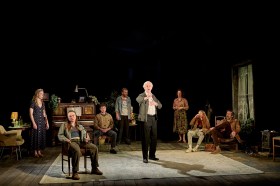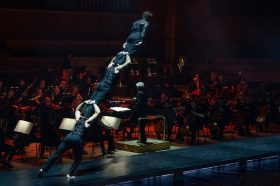Italy is a country renowned for its ancient temples, amphitheatres, market places and aqueducts. The cultural significance of its heritage is evident in the ongoing archaeological digs – not to mention the hordes of tourists these relics attract. But until the year 2000, one particular practice of recording and conserving its archaeological sites was illegal. Now, thanks to a project realised with the assistance of European Union (EU) funding for culture, the country has established its first Aerial Archaeological Research School.
With financial support from the EU’s Culture 2000 funding programme, the Conservation through Aerial Archaeology (CAA) project began in November 2000 and continued throughout 2001. A series of specialised workshops and conferences took place in Poland, Britain, Italy and Germany with the aim of increasing the number of professional archaeologists with knowledge of aerial archaeology techniques in Europe.
English Heritage was the lead body from the UK. Project Manager Bob Bewley explains that the most successful and important outcome of the project was the Aerial Archaeology School, held in the picturesque medieval city of Siena, in Tuscany. The workshops took place from May to June in 2001 and, as a result, the students from the School will form the first group of native Italian air photographers to help record and survey their nation’s rich archaeological heritage. The final report of the CAA project found that the School ‘was the most successful of three mounted across Europe in the past five years.’
The Culture 2000 fund was established by the EU to fund pan-European performing and visual arts, cultural heritage and literary projects, involving at least three partner organisations. The scheme provides funds annually and will operate up until 2006. While European Union funding is often criticised for the amount of paperwork and bureaucratic procedures involved, most respondents to Arts Hub conceded the projects funded would not have gone ahead – at least not on such a grand scale – without the availability of the funds.
‘It is appreciated that paperwork is necessary,’ Bewley comments. ‘The application form was not easy to fill in – but then, why should it be?’
Bewley said the accounting procedure at the end of the project was complex, but overall it was still manageable. And English Heritage had competent financial managers on board, he adds.
‘I’d rather have to go through the hoops – however difficult – than think the EU was not monitoring expenditure carefully,’ Bewley says.
Euclid International, the contact point for the Culture 2000 programme in the UK, will host a conference in December to look at successful projects, as well as try and identify ways to improve the scheme. Initially, the Culture 2000 scheme was to draw to a close in 2004, however it has now been extended until 2006.
‘In a way, that’s good news,’ comments Geoffrey Brown, Director of Euclid. ‘On the other hand, it’s not quite so good, because there are a few things which are not quite right with it [Culture 2000],’ he claims.
Brown has observed that some people are opposed to the EU funding cultural projects because they hold the belief that such funding should be the responsibility of individual country’s governments. Meanwhile, a practical difficulty with the scheme, he notes, is the administrative hurdles: delays in calling for applications and announcing successful projects, as well as the complexity of filling out application forms, have also borne the brunt of criticism.
One of the reasons for holding the conference, Brown explains, is due to the fact that the EU is now beginning to launch discussions about future culture funding programmes, to replace Culture 2000 after 2006.
In his view, a major addition to any new pan-European culture fund could be cross-cultural residencies.
‘I think a funding scheme for cultural cooperation is a very good thing to have,’ he concedes. ‘I think one area, which other funding programmes provide, is a mobility programme.’ This could be in the form of a sub-criteria, he explains: ‘Which is, simply, to give people €500 or €1000 so an individual can go and spend a few weeks living in another country with a different organisation.’
The conference, Cultivating Cultural Co-Operation, will be opened by Arts Minister Estelle Morris and will feature a number of keynote speakers, including Antonios Kosmopoulos, Head of the Culture 2000 Unit at the European Commission. The event will feature presentations from over 20 cultural organisations that have taken part in Culture 2000-funded initiatives, such as the Conservation through Aerial Archaeology project.
Another organisation attending is the UK-based arts and science body, The Arts Catalyst, which has been involved in a ground-breaking project with three other European arts and science organisations conducting research into altered gravity conditions.
MIR, or Microgravity Interdisciplinary Research, is a consortium of arts organisations including The Arts Catalyst; the Leonardo Observatory for the Arts and the Techno-Sciences, France; Projekt Atol, Slovenia; and Netherlands-based V2.
The project aims to promote arts and cultural activity as part of the international space programme and has so far resulted in a number of artists and scientists undertaking research at the Gagarin Cosmonaut Training Centre (GCTC) at Star City in Russia earlier this year.
In one project, grains of specially grown bacteria (kefir) were sent off in an aircraft to experience variable gravity, their behaviour documented and used to produce a ‘sci-fi’ animation movie. In another, UK researcher Rebecca Forth explored the respiratory and cardiovascular effects of playing a clarinet in zero gravity.
The Culture 2000 support for these projects was ‘invaluable’, according to The Arts Catalyst Director, Nicola Triscott. ‘It would not have happened without it,’ she adds.
Meanwhile, Culture 2000 funds were also used to establish the European Association for Jewish Culture – an independent grant-making body that commissions new work and provides part-funding to Europe-based artists for new project which reflect the Jewish experience.
‘Many contemporary artists and cultural presenters have been looking for ways to make a distinct Jewish contribution to European culture and the EAJC was established to nurture their work and to encourage access to Jewish culture in Europe,’ explains coordinator Lena Stanley-Clamp.
She also admits the venture would not have got off the ground without Culture 2000 funding, however, the challenge the organisation now faces is securing ongoing financial support.
‘The Culture 2000 grant was essential in providing funds for the establishment of EAJC and contributing to our operations in the first year,’ she told Arts Hub. ‘Since then we have been relying on other philanthropic sources to fund the grants and our operation, but further funds have to be raised to ensure the future of the EAJC, which is a difficult challenge.’
The Cultivating Cultural Co-Operation conference takes place on December 3, at Canada House, Trafalgar Square, London. Cost is £117.50. To obtain a registration form email Euclid or visit the Euclid website.
Related Websites
European Association for Jewish Culture: www.jewishcultureineurope.org
The Arts Catalyst: www.artscatalyst.org
Aerial Archaeology Research Group website: http://aarg.univie.ac.at/

_Encounters-in-Reflection_Gallery3BPhoto-by-Anpis-Wang-e1745414770771.jpg?w=280)


